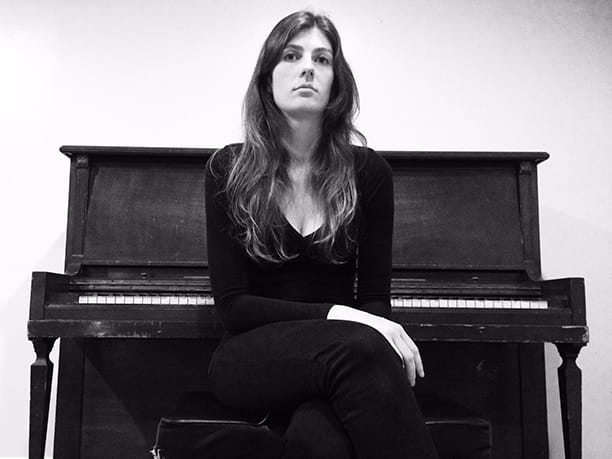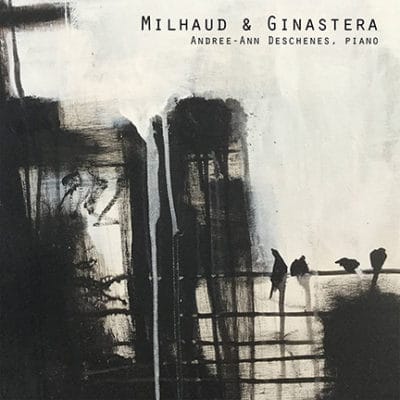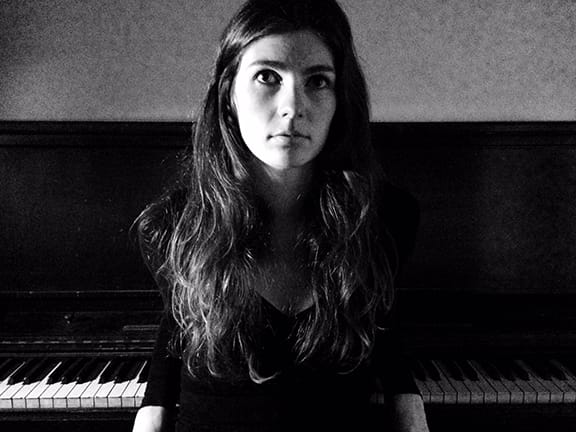A Q&A with “indie pianist” and doctoral music student Andree-Ann Deschenes

Keys to Success: The doctoral music student balances graduate studies and part-time teaching—with being an “indie pianist”
There was this headline after teenage songstress Lorde won a Grammy in 2014 for “Royals,” beating out fellow nominees Bruno Mars and Katy Perry. And it was something like, Lorde wins Grammy at age 17. What have you done?” Well, we felt a pinch of that headline after learning that CGU doctoral music student Andree-Ann Deschenes has released her second album, Milhaud & Ginastera, on iTunes. Because, amazing.
For her first album, the French Canadian pianist just happened to win a Silver Medal for Outstanding Achievement in the 2016 Global Music Awards. And somehow she’s achieved this all between classes in CGU, and between teaching gigs at California State University, Los Angeles, where she earned her master’s degree and serves as adjunct faculty.
Deschenes is what she calls an “indie pianist, if there is such a thing!” She is also humble, and extremely responsive to questions about her time at CGU, which professor has been right by her side, the process of cutting an album, and what she wants to do with her degree. She recently shared these thoughts about all of the above, and more.

Your new album—congratulations! How long did you spend putting it together? And how did you choose which pieces to include?
I think the longest part of the process is definitely just learning the material and putting it together. I started working on my DMA [Doctor of Musical Arts] recital program in late October 2015, for an April 2016 recital. So that’s prep time right there! Every day leading up to that performance was mostly spent practicing and fine-tuning the subtle intricacies of these pieces. The recording itself was over three different days, with sessions of about four to five hours each. Then of course you have to work on graphic design, getting the CDs pressed and ready for distribution, all of that. So I worked on this album for about nine months total.
As for choosing the pieces, that’s the beauty of doing it all myself—I can release whatever I want without constraint! I think a lot of classical musicians don’t realize they can release an album independently, much like pop artists do. Of course, if you’re a household name, you’re probably going to have a complete team of people and producers working with you, advising you, and probably making decisions for you in the end. But for now I love having complete creative control over what I’m doing. This includes the pieces I decide to put out, but also how I market the album, how it looks, and everything about it.
I chose Milhaud’s Saudades do Brasil because they are such unique little gems of music—they sound like nothing else you’ve ever heard before. And every time you listen, you’ll hear something you didn’t hear before. I think they’re a perfect blend of Latin American flair and French nobleness, and I just totally fell in love with the pieces after hearing one of them in one of my CGU classes, with Dr. Peter Boyer. As far as Ginastera’s Danzas Argentinas, they are well known so I felt like that would offer balance and draw more listeners to the album. The harmonies in those pieces are fantastic, and I love the rhythmic aspect that drives the music.
(Editor’s note: Listen to Deschenes play Milhaud’s “Paysandu” by clicking on the video below)
So, how did you “break into” the business?
I think many classical musicians are either too afraid, or just not aware you can record things and put them out yourself. It’s a curse and a blessing in the music industry. I decided to treat this release much like if I was a pop artist. I made it all myself, made a music video . . . It sounds obvious if you’re a singer-songwriter, but I get a lot of questions from fellow colleagues on how I did it. There’s no secret. The resources are all available to you if you know how to use them and are ready to sit at your computer for a very long time! (Laughs) It seems that in this day and age, you need to get things done, get them out there, and watch them snowball to get more opportunities down the line. I’m hoping the more music I release, and the more accessible it becomes, [it] will eventually open opportunities with labels and other media companies. But you need to have a product to market to attract attention. So I figured I would create my own opportunities to start and be an indie pianist, if there’s such a thing!
How many years have you played piano?
I’ve been being playing since I was about 6 years old, so over 20 years at this point. However, I was as serious as any 6-year-old kid is serious about anything—if I practiced 15 minutes every day, I felt pretty good. (Laughs) I wasn’t groomed to be a child prodigy, or a concert pianist from a young age. I was just taking lessons because I enjoyed music and I wanted to learn. I definitely started getting more serious about it in high school, and started really discovering my strengths and interests at that point. Then again, I’m not too fond of that question, because every time I give the answer, I feel like I should really be better than I am after all these years!
Did you know immediately that you had skill, or extraordinary interest in it?
That’s a good question. It came easy to me, but I was also a good student at school, so I felt like everything came easy to me at that young age. I didn’t really give it that much thought. As I got older and started performing more, and eventually went to college and met with musicians from all over the place who were all very talented, I realized that I had some talent, yes, but I also have to keep working super hard since this is such a competitive field.
What advice do you give to young people who want to learn piano?
Find the music that you want to play. I was very fortunate, in my opinion, to not grow up in a conservatory environment or be pushed to fulfill certain curriculum requirements for “levels” and “exams.” I had an amazing teacher who fostered my own musical interests. And, while she ensured I wasn’t missing out on any formal musical education—call it what you like—she also made sure I was learning and exploring genres and styles I wanted to play. This is how I got into jazz and eventually Latin music as well, which led me to the repertoire I’m focusing on right now: Latin American piano composers. You don’t have to follow the same path as everybody else, and you’ll be much more successful if you play up your strengths. But obviously no matter what you do, or what instrument you want to play, you have to put in the time and the effort, and all those rainy afternoons practicing eventually pay off!

Why did you choose CGU for your advanced degree?
I’ve always preferred smaller communities, which is ironic since I live in Los Angeles! CGU’s Music Department is quite small—if you compare it to USC or UCLA—and I think that’s what made it so attractive to me. I didn’t see the point in going to a larger school where I would probably lose myself in the sea of students, and where I would have to stick to certain repertoire materials. You get much closer contact with your faculty members at CGU, and I think this is really an advantage for students, especially at the graduate level. The music program is also strongly musicology-oriented, which was definitely a plus. Of course my main focus is performance, but I also love research, and I’m learning a lot, which is going to prepare me even more for a career in academia later on. The main thing I’m working on is Latin American piano composers, and one of the issues with this repertoire is the lack of written material about the music, the composers, etc. So attending a school with a lot of research resources and faculty very active in the field of musicology is definitely a bonus when it comes time to write my DMA paper.
Is there a particular faculty member who’s helped in some capacity in your production of a second album?
I’d be lying if I said no! My piano instructor, Dr. Jenny Kim, was certainly an immense part of the preparation for this album. She’s the one who helped me put all the musical material together. All of the pieces I recorded were part of the program for my first DMA recital, so I definitely owe it to her patience, and her devotion to students. I think I’m fortunate to study with her, and she’s been very encouraging since we started working together. She also came to the first recording session to check the place out, and hear a few takes!
How do you possibly balance it all? Doctoral student. Faculty. Recording artist…
It sounds like a lot, but I think it all ties in! As a musician, you have to diversify your professional opportunities. That’s probably true of any field these days, though. I think it also helps to be really passionate about everything you’re doing. If I wasn’t completely in love with my musical repertoire, it would be hard to find time to practice between the classes I attend and the classes I teach, for example. I don’t think I’ve ever had one music professor who simply taught and didn’t have musical ventures outside of school. That’s just how it is. It keeps things interesting, it keeps you sane, and it keeps you on your toes! I also told myself, when I went back for my doctorate degree, that I wouldn’t fall prey to the “college vacuum” as I call it—where everything in your life revolves around school, and your only performance opportunities are related to school, etc. I wanted to keep being my own person, and develop my professional network/career as I was completing my studies, to avoid the post-graduation limbo, where you have no idea what you should be doing, and have far too much time on your hands!
Where do you see yourself after you graduate?
That’s tough. Ideally, I’ll still be doing exactly what I’m doing now: teaching, recording, performing, but on a bigger scale. This is definitely why I decided to go for my doctorate degree in the first place—to get better and bigger opportunities in my chosen field. I’m hoping to secure academic employment of course, but I also want to keep recording, which I absolutely love doing. I’m very fortunate to work with faculty members and classmates who recognize the value of the work I’m trying to do, which obviously is very important to me.
You must have a hobby outside of music, right?
My hobby is my dog! I’m literally obsessed with her. She’s the most adorable German Shepherd in the whole world, and every time I have a little bit of time off, or take a day off, I try to do fun activities with her. She’s very patient with me being so busy, so any free time I have is spent with her!